In this guide
- Review
- Details
- Product details
- Your reviews
- Ask a question
OpenSea review and guide
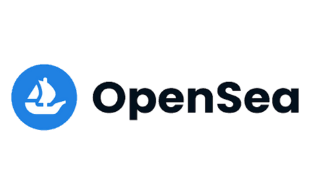
Summary
Buy and sell unique digital assets on the largest NFT marketplace in the crypto space.
- Has the biggest variety of NFTs on the market
- Doesn’t allow payments in fiat currencies like AUD and USD.
Check out our full list of pros and cons or read on.
In this guide
- Review
- Details
- Product details
- Your reviews
- Ask a question
Details
Product details
| Product Name | OpenSea |
| Payment methods |
Credit card Debit card Cryptocurrency |
| Services |
Buy Sell Mint |
| Buyer fee | 0% |
| Seller fee | 2.5% |
| Blockchain |
Ethereum Polygon Klaytn Arbitrum Optimism Avalanche Zora Network Base |
| Supported payment currencies |
Fiat Cryptocurrency |
What is OpenSea?
OpenSea is a decentralised marketplace that enables the buying, selling and trading of non-fungible tokens (NFTs). Once proclaimed as the "eBay for CryptoKitties", OpenSea has expanded beyond collectibles to become a marketplace for other types of non-fungible assets such as game items, music, domain names and many more.
The platform was a leading NFT exchange in the crypto industry and was founded in January 2018 by programmers Alex Atallah and Devin Finzer to facilitate the trading of the first generation of digital collectibles. Today, OpenSea is the second-largest NFT marketplace by volume, according to data from DappRadar. The platform allows you to explore and acquire millions of NFTs in hundreds of categories. You can also list NFTs that you've created or bought from somewhere else.
It's available on 9 blockchains and layer-2 networks, including Ethereum, Binance Smart Chain, Avalanche, Solana and Polygon.
How does OpenSea work?
As a decentralised marketplace, OpenSea's smart contracts allow users to interact with the platform without surrendering custody of their NFTs. Your digital assets do not need to leave your wallet until you make a transaction. You don't even need to create an account as long as you have a supported web3 wallet such as MetaMask.
All assets within the marketplace are owned by OpenSea users, not the platform itself. You can buy these NFTs using Ether (ETH) and other supported cryptocurrencies. The marketplace has a Browser page that allows you to search for NFTs.
If you're after a specific NFT, you can go over to the search bar and look for it. You can also filter out your search by category, collection, blockchain network and status. Once you get the results of your search, you can sort them by listing date, price or viewers.
What currencies can you use on OpenSea?
OpenSea primarily accepts ETH, DAI, SOL, AVAX, USDC for purchases.
If you don't own any cryptocurrency yet, then you can purchase some via a third-party service (eg, MoonPay) via the OpenSea platform using a credit or debit card.
Exchanges that offer Ethereum (ETH)
Compare other products
We currently don't have that product, but here are others to consider:
How we picked theseWhat types of NFTs can you buy on OpenSea?
OpenSea offers virtually all types of NFTs. It has around 200 categories, 8 of which stand out:
- Art. Digital artworks that come in the form of images, gifs or short video clips made to convey an artistic expression, such as The Hills.
- Music. Songs, beats, remixes and mixtapes made by music artists, some of which come in video format, for example, Ultraviolet Loyalty #226/340.
- Domain Names. Blockchain-based domain names are censorship-resistant websites that cannot be shut down by anyone, such as finder.eth or pets.crypto.
- Virtual Worlds. Also known as metaverses, these are essentially virtual-reality spaces and all the materials and users they contain including the environment, characters, game items, virtual lands, virtual objects and more. Examples include The Sandbox and Axie Infinity.
- Trading Cards. These are akin to physical trading cards but have added attributes besides being digitally native, for example, BCCG and Sorare.
- Collectibles. NFT collectibles are digital objects such as pets, avatars and characters that users collect and trade. Their scarcity gives them value as each of them is unique and has a limited number of variants available, for example, CryptoPunks and Nyan Cat.
- Sports. These are NFTs with sports elements such as Animated NBA logos.
- Utility. There are types of NFTs that have specific functions or purposes like Urbit ID and Emblem.Finance.
How do you buy an NFT on OpenSea?
Buying NFTs on OpenSea is fast and easy once you get the hang of it. But for beginners, there is a bit of a learning curve at first. Let's run through the process step-by-step.
-
You'll use ETH to buy your NFTs later on so be sure you have enough. If you don't own any ETH, then check out our here to buy Ethereum (ETH) guide to get started.
-
OpenSea supports several web3 wallets, but for this example, we'll use MetaMask since it is the most used option. Visit our MetaMask review to find out how to install the browser-based wallet.
-
Now that you have MetaMask set up, you'll need to transfer your ETH into it. MetaMask allows you to buy and sell digital assets on OpenSea without giving the platform custody over your funds.
-
Head over to opensea.io and click "My Profile".
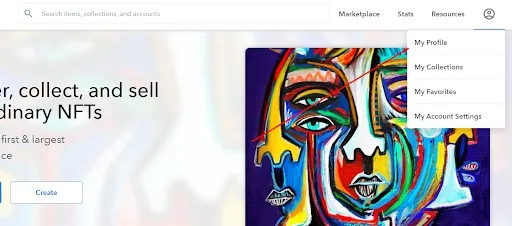
-
MetaMask is usually the default wallet. Click "Sign In". You will be directed to your profile page, which you can edit as you please before deciding what to buy.
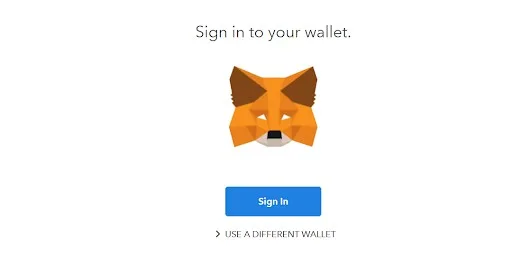
-
Hover over the "Marketplace" section and select the category of NFT you wish to buy. If you don't have a preference, choose "All NFTs".
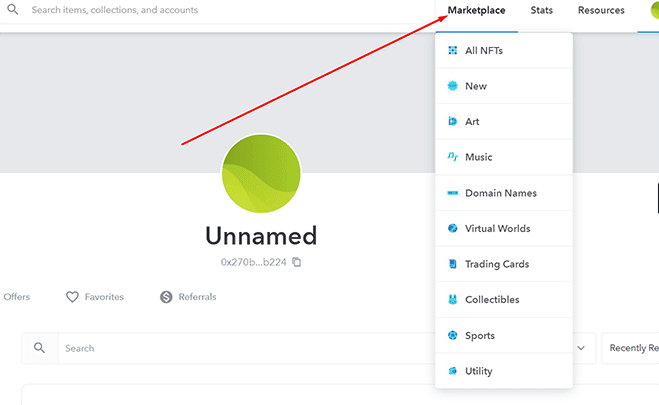
-
You can browse the marketplace or use the search bar to find specific digital assets. If you find a worthy pick, click on it, then click "Buy Now". The platform will then show you the total amount required, including the fees. Click "Checkout".
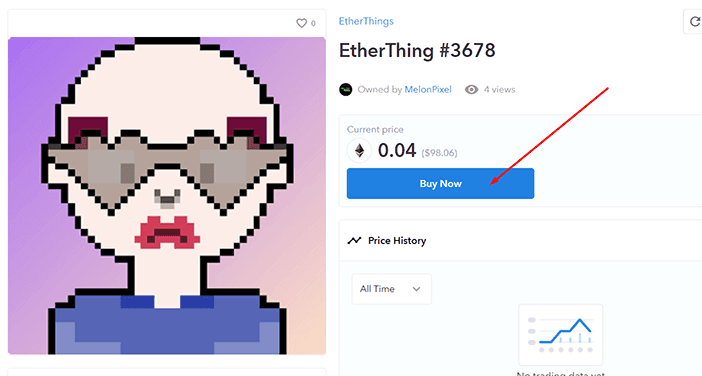
-
Your MetaMask extension will next prompt you to approve the transaction. Click "Confirm". You should receive your NFT in your wallet shortly.
Do you need to store your NFTs? How do you do so?
Yes, you need to store your NFTs in a wallet since OpenSea does not take custody of any assets. You can store your NFTs on MetaMask or other supported web3 wallets such as Bitski, Fortmatic, WalletConnect, Portio, Kaikas and the like.
How do you sell an NFT on OpenSea?
You can sell your NFTs on OpenSea by simply listing them in the Marketplace. Follow these steps to list your digital assets:
- Connect your web3 wallet.
- Navigate to your profile page.
- Click on the NFT you want to sell.
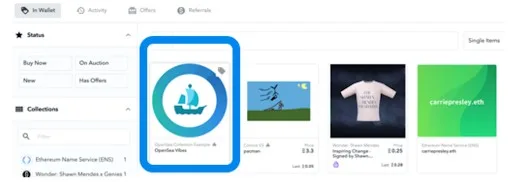
- Select "Sell".
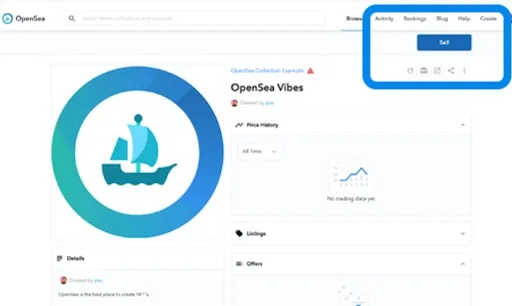
- Now fill in your desired price, type of auction and other details. Once done, click on "Post Your Listing". Note that OpenSea charges a one-time gas fee for first-time sellers.
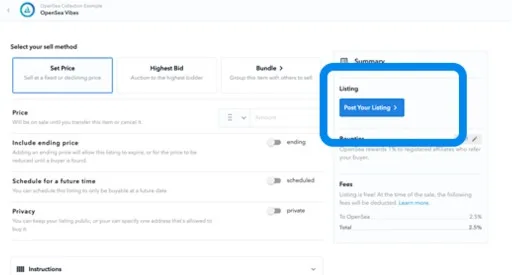
You can view all the assets you have listed for sale by clicking on your profile page and then clicking on the "Activity" tab.
Selling options on OpenSea
- English Auction. A seller puts up an NFT for sale, sets a minimum price and waits for buyers to bid. OpenSea will automatically accept the transaction if the auction finishes above 1 ETH. If the auction finishes below 1 ETH, it is the seller's choice if they want to accept the highest bid. The seller is under no obligation to complete the transaction.
- Dutch Auction. Similar to fixed-price listings but the price falls over time. A seller initially puts an asset up for sale at an extremely high price which progressively lowers over time. Once the price drops to a valuation equal to a buyer's bid, the buyer can receive the item right away. Buyers are also welcome to make an offer.
- Fixed Price. A seller lists an NFT and the price never changes.
- Bundles. The Bundle feature allows you to sell multiple NFTs under one transaction. You can list up to 30 items in a bundle.
- NFT Creation. You can mint your own NFTs in the platform and sell them on its marketplace.
OpenSea fees
| Customer | Fee |
|---|---|
| Buyers | none |
| Sellers | 2.5% |
Is OpenSea safe to use?
Yes, OpenSea is a relatively secure NFT marketplace since it's completely decentralised and simply connects different cryptocurrency wallets with each other without taking custody of the assets in question. Decentralised platforms are in theory more secure than centralized marketplaces since they don't act as custodians that hold user funds and also have no central point of failure such as a server that can be targeted with Distributed Denial of Service (DDOS) attacks.
For example, centralized NFT marketplace Nifty Gateway suffered a security breach in March 2021, when hackers managed to obtain the credentials of a few customers who didn't have the 2-factor authentication secure measure turned on, and absconded with some of their NFT assets.
Moreover, unlike more vulnerable DeFi protocols, OpenSea doesn't employ staking or any feature that requires depositing assets to smart contracts, which means there is no way hackers can steal user funds through bugs or other exploits. All NFT assets remain in user wallets unless they are bought.
However, it must be noted that hackers often come up with ingenious ways to trick victims, and that users should be especially vigilant against practices such as phishing sites. Always make sure that you're indeed connecting to the official OpenSea.io site, and not a counterfeit version.
Pros and cons of OpenSea
Pros
- Large quantity. OpenSea offers a vast array of various types of digital assets and is the largest NFT marketplace as of 2021.
- Low platform fees. The platform boasts one of the lowest fees among all major NFT exchanges in the space.
- Secure. OpenSea is a decentralised protocol that has never been hacked.
Cons
- No fiat support. Decentralised systems like OpenSea do not support payments with conventional currencies like AUD or USD.
- Declining popularity. Once the largest NFT marketplace by volume, OpenSea has lost the bulk of marketshare to Blur.
- No royalty fees. In March 2024, OpenSea disabled mandatory collection of royalty resale fees for artists, which provided the artists with revenue each time their NFT was traded on OpenSea.
Frequently asked questions
-
The processing time of a purchase depends solely on the traffic of the network. If you are experiencing delays, chances are that there is a spike in usage. You can visit Etherscan and input your details to find out the estimated time frame for your transaction to be confirmed.
-
Yes, but only for "fixed-price" listings.
-
Head over to the homepage of the OpenSea website and click on "Create". You will then be directed to the "Collections" page. Click "Create" again. Input the name and description of the collection, as well as the logo. After that, you can begin adding NFTs to the collection by selecting "Add Items" and placing all the necessary details like your website, social media accounts, royalties and so on.
Sources
-
Finder writers are subject matter experts and use primary sources, in-depth research and interviews with other experts to ensure you're getting accurate, up-to-date information. Articles are fact checked in line with our editorial guidelines.
Your reviews
Werner Finder
Writer
Hi there, looking for more information? Ask us a question.
You are about to post a question on finder.com.au:
- Do not enter personal information (eg. surname, phone number, bank details) as your question will be made public
- finder.com.au is a financial comparison and information service, not a bank or product provider
- We cannot provide you with personal advice or recommendations
- Your answer might already be waiting – check previous questions below to see if yours has already been asked
Finder only provides general advice and factual information, so consider your own circumstances, or seek advice before you decide to act on our content. By submitting a question, you're accepting our Terms Of Service and Finder Group Privacy & Cookies Policy.
This site is protected by reCAPTCHA and the Privacy Policy and Terms of Service apply.

Werner Vermaak is a technical writer and blockchain consultant with an extensive 20-year marketing resume across Taiwan, the UK and South Africa. He came across Bitcoin and cryptocurrency in Taiwan during mid-2017 and has worked with several companies and projects in the areas of crypto security, regulations, custody and new fields such as DeFi, NFTs and Web 3.0 since. Werner has a business degree from Stellenbosch University and postgraduate qualifications in strategic marketing from the AAA School of Advertising. Werner enjoys geeking out on new technology and pondering the mass adoption of digital assets. See full profile